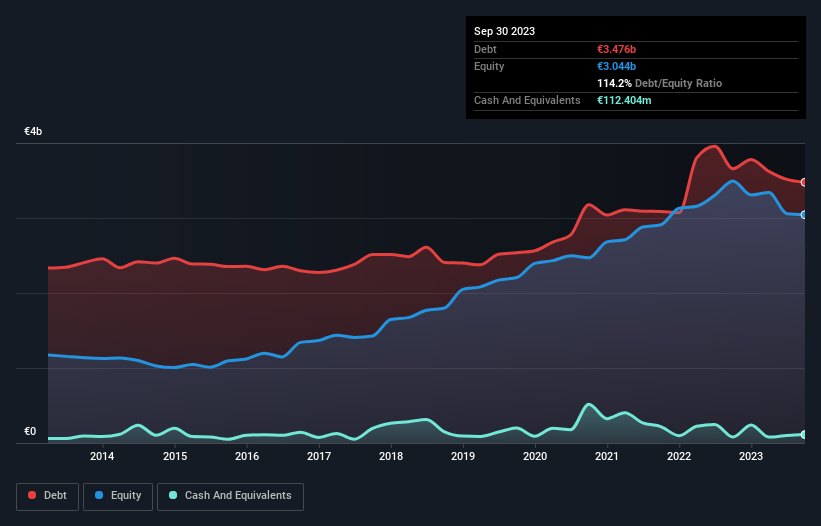Legendary fund manager Li Lu (who Charlie Munger backed) once said, 'The biggest investment risk is not the volatility of prices, but whether you will suffer a permanent loss of capital.' So it seems the smart money knows that debt - which is usually involved in bankruptcies - is a very important factor, when you assess how risky a company is. We note that TAG Immobilien AG (ETR:TEG) does have debt on its balance sheet. But is this debt a concern to shareholders?
When Is Debt A Problem?
Debt is a tool to help businesses grow, but if a business is incapable of paying off its lenders, then it exists at their mercy. Part and parcel of capitalism is the process of 'creative destruction' where failed businesses are mercilessly liquidated by their bankers. While that is not too common, we often do see indebted companies permanently diluting shareholders because lenders force them to raise capital at a distressed price. Of course, plenty of companies use debt to fund growth, without any negative consequences. When we think about a company's use of debt, we first look at cash and debt together.
View our latest analysis for TAG Immobilien
What Is TAG Immobilien's Debt?
The image below, which you can click on for greater detail, shows that TAG Immobilien had debt of €3.48b at the end of September 2023, a reduction from €3.66b over a year. However, it does have €112.4m in cash offsetting this, leading to net debt of about €3.36b.

How Strong Is TAG Immobilien's Balance Sheet?
According to the last reported balance sheet, TAG Immobilien had liabilities of €829.9m due within 12 months, and liabilities of €3.78b due beyond 12 months. Offsetting this, it had €112.4m in cash and €46.2m in receivables that were due within 12 months. So its liabilities outweigh the sum of its cash and (near-term) receivables by €4.46b.
The deficiency here weighs heavily on the €2.13b company itself, as if a child were struggling under the weight of an enormous back-pack full of books, his sports gear, and a trumpet. So we'd watch its balance sheet closely, without a doubt. At the end of the day, TAG Immobilien would probably need a major re-capitalization if its creditors were to demand repayment.
In order to size up a company's debt relative to its earnings, we calculate its net debt divided by its earnings before interest, tax, depreciation, and amortization (EBITDA) and its earnings before interest and tax (EBIT) divided by its interest expense (its interest cover). This way, we consider both the absolute quantum of the debt, as well as the interest rates paid on it.
With a net debt to EBITDA ratio of 12.0, it's fair to say TAG Immobilien does have a significant amount of debt. However, its interest coverage of 4.4 is reasonably strong, which is a good sign. On a lighter note, we note that TAG Immobilien grew its EBIT by 25% in the last year. If it can maintain that kind of improvement, its debt load will begin to melt away like glaciers in a warming world. There's no doubt that we learn most about debt from the balance sheet. But it is future earnings, more than anything, that will determine TAG Immobilien's ability to maintain a healthy balance sheet going forward. So if you want to see what the professionals think, you might find this free report on analyst profit forecasts to be interesting.
But our final consideration is also important, because a company cannot pay debt with paper profits; it needs cold hard cash. So we clearly need to look at whether that EBIT is leading to corresponding free cash flow. During the last three years, TAG Immobilien produced sturdy free cash flow equating to 74% of its EBIT, about what we'd expect. This free cash flow puts the company in a good position to pay down debt, when appropriate.
Our View
Both TAG Immobilien's level of total liabilities and its net debt to EBITDA were discouraging. But at least its EBIT growth rate is a gleaming silver lining to those clouds. Taking the abovementioned factors together we do think TAG Immobilien's debt poses some risks to the business. While that debt can boost returns, we think the company has enough leverage now. The balance sheet is clearly the area to focus on when you are analysing debt. However, not all investment risk resides within the balance sheet - far from it. Case in point: We've spotted 1 warning sign for TAG Immobilien you should be aware of.
If you're interested in investing in businesses that can grow profits without the burden of debt, then check out this free list of growing businesses that have net cash on the balance sheet.
Valuation is complex, but we're here to simplify it.
Discover if TAG Immobilien might be undervalued or overvalued with our detailed analysis, featuring fair value estimates, potential risks, dividends, insider trades, and its financial condition.
Access Free AnalysisHave feedback on this article? Concerned about the content? Get in touch with us directly. Alternatively, email editorial-team (at) simplywallst.com.
This article by Simply Wall St is general in nature. We provide commentary based on historical data and analyst forecasts only using an unbiased methodology and our articles are not intended to be financial advice. It does not constitute a recommendation to buy or sell any stock, and does not take account of your objectives, or your financial situation. We aim to bring you long-term focused analysis driven by fundamental data. Note that our analysis may not factor in the latest price-sensitive company announcements or qualitative material. Simply Wall St has no position in any stocks mentioned.
About XTRA:TEG
TAG Immobilien
A real estate company, engages in the acquisition, development, and management of residential real estate properties in Germany.
Fair value with mediocre balance sheet.
Similar Companies
Market Insights
Community Narratives




